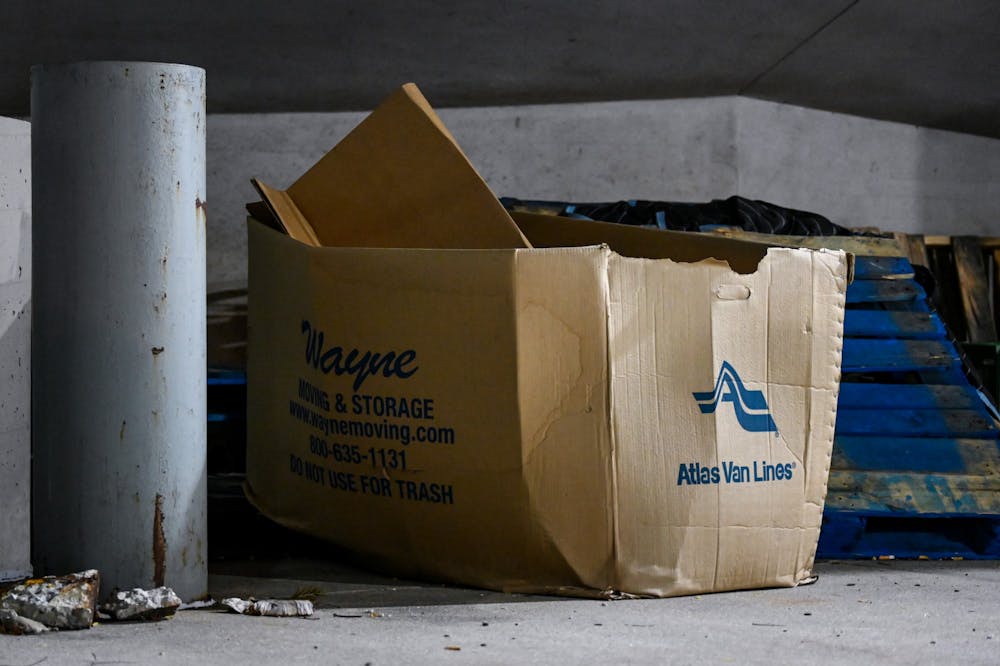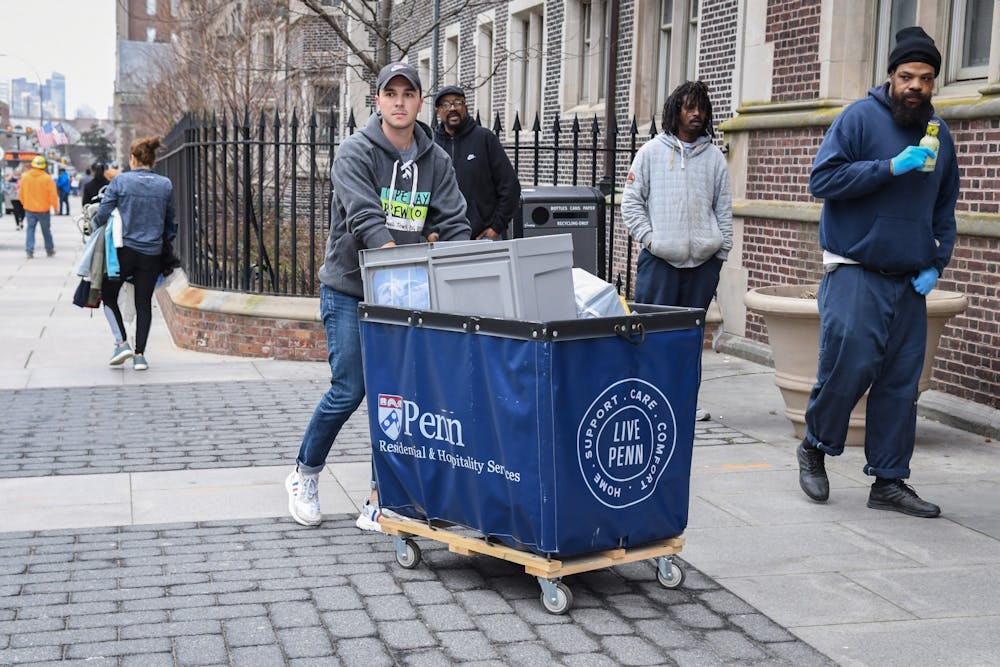
Wayne Moving and Storage is one of the companies Penn contracted to handle students' belongings.
Credit: Kylie CooperDespite promises from Penn to cover costs to ship students’ belongings left in the College Houses back home, many students remain frustrated that they no longer have the option to store items for free until January 2021.
Following student backlash on the costly and disorganized dorm item retrieval process, Penn Business Services Director of Communications and External Relations Barbara Lea-Kruger wrote in an email to The Daily Pennsylvanian on Aug. 31 that Residential Services would cover costs to ship students’ belongings home. Residential Services later clarified on its FAQ page that given the shipping subsidies, it would no longer cover the cost of storing students’ belongings until January 2021 as it previously had promised. Students must now choose to have all belongings shipped home, or have them donated or discarded at no cost.
“Because the University is paying to ship belongings to students, students will no longer have access to University acquired storage and do not have the option to have their items stored,” Residential Services' FAQ page reads.
While Residential Services will subsidize an unlimited amount of boxes to be shipped to domestic or international home addresses, students will have to pay out of pocket to ship furniture items such as couches, chairs, tables, desks, and floor lamps, according to the FAQ page. The average cost to ship furniture across the country ranges from $300 to $600, according to shipping service uShip.
Many students expressed frustration with what they described as an “all-or-nothing” policy and called on Residential Services to cover the cost of storing students’ belongings — particularly furniture items for which it will not cover shipping costs for — until January 2021. Some cited concerns about international students or students who live far from Penn having to pay to ship items back to Philadelphia when they inevitably return to campus.
College and Wharton sophomore Ananya Dewan, who lives in Las Vegas, said she would prefer to store her items in Philadelphia until she returns to campus. Transporting her belongings back to campus from Las Vegas to Philadelphia would be a costly expense which she said could easily be avoided if Residential Services continued to pay for storage.
“I have a lot of stuff in Philly right now, and it doesn't make sense for me to bring it all home where it's not going to do me any good,” Dewan said. “There definitely should have been the option to either completely store your items or completely ship your items.”
Like Dewan, College sophomore Megha Nair said that Penn should have given students the option to store their belongings, particularly large pieces of furniture that are both valuable and expensive to ship. Though Nair hails from Chicago, she is considering shipping her belongings to a family friend's address in Washington, D.C. in order to mitigate costs associated with air travel and transporting her items back to campus.
“Especially for international students, it’s not affordable, obviously, to send your furniture back overseas to Penn. If Penn and the storage companies had worked out an agreement for certain people to store belongings, that would have been a lot more convenient for everyone,” Nair said.

Some students said Residential Services never notified them about its policy reversal earlier this month on the shipping and storing costs, leaving them to figure out their retrieval process by directly contacting their moving companies.
College sophomore Chase Seklar said that he learned from a DP article that Penn would cover the cost of shipping students’ belongings and contacted his moving company Sinclair Moving and Storage directly. A representative from the company encouraged Seklar to arrange a video conference to go through his boxes in the warehouse and prepare his belongings for shipping.
College sophomore Rebecca Hennessey said that neither Residential Services nor her moving company School Storage has contacted her about the dorm item retrieval process since August. Hennessey said that she cannot afford to ship her furniture items home and is frustrated that Penn will discard them rather than store them for the semester.
“I can't afford to go out and buy another mini fridge. I also had a beanbag, a storage cubby, and microwave. It’s really disheartening that they're gonna throw it all out,” Hennessey said.
Residential Services sent a “Ship-To Form” via email to students on Sept. 18 which required them to submit their contact information, shipping address, and three available times to "finalize an appointment" with the moving company about shipping. The form was due on Sept. 27. Neither Seklar nor Hennessey received this email.
After spending months without their belongings, students called on the University to subsidize shipping costs for their dorm items earlier this August. Some now say that by granting subsidized shipping costs and eliminating free storage, Residential Services has traded one drawback for another.
Some students already retrieved their belongings from storage in late August, only to find that many of their belongings were broken or missing, including valuables like television sets and microwaves. Those who receive shipments with missing or damaged items can file insurance claims totaling up to $4,500 to National Student Services, Inc.
As the threat of coronavirus looms over the spring semester, some students, including Dewan, speculated that Residential Services’ reversal constitutes a strategic financial decision, not an ethical one: If the spring semester is also conducted remotely, it would be cheaper to ship students’ belongings home than have to pay for another semester’s worth of storage costs.
“It seems at this point, Penn is not really considering the actual well-being of students," Dewan said. "What they're considering are the financials. The fact that they didn't do this earlier shows that they were not really concerned with students not having their possessions or valuables. At this point, they're just worried about how long they are going to have to incur storage costs for every single student.”
The Daily Pennsylvanian is an independent, student-run newspaper. Please consider making a donation to support the coverage that shapes the University. Your generosity ensures a future of strong journalism at Penn.
Donate



